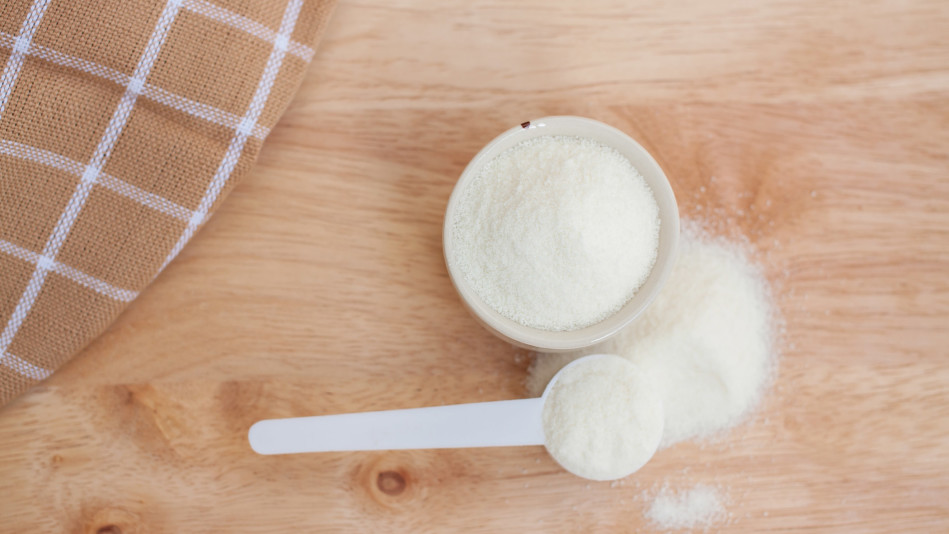People Are Eating Collagen and Here's What You Need to Know About It
From bone broth to smoothies, the ingredient is everywhere lately.

Photo: iStock/nikam1234
It used to be that when people talked about collagen, they were referring to injections that plump up the skin, making it more youthful looking. Now, a new wave of edible collagen products is flooding the market, such as powders, which you can add to coffee or smoothies and pills that you can take along with your morning multivitamin. They claim to support hair, skin, nail and joint health—but is it possible to benefit from ingesting collagen?
First off, what exactly is collagen?
Collagen exists in our bodies—it's a protein that binds tissues. As we get older, our bodies make less of it. To combat collagen loss, doctors recommend everything from wearing sunscreen to quitting smoking. Aside from making these kinds of lifestyle or behavioral changes, doctors say our diet can also play a role in boosting collagen—and that doesn't mean you need to consume gallons of collagen-rich bone broth. Rather, try to eat many of the ingredients that constitute a healthy diet, from eggs and fish to dark leafy greens and citrus fruits, because while they don't contain collagen itself, they deliver nutrients your body uses to make it.
What does science say?
The truth is, there's not a lot of research to support the claim that ingesting collagen—whether via bone broth or as a powder sprinkled over your smoothie—can firm up your skin long-term, though some small studies have found it improved skin elasticity and strengthened brittle nails. Still, Harvard Women's Health Watch says dietary collagen doesn't get transported directly to your skin; this Center for Science in the Public Interest article explains it in more depth. Here's the gist: When you consume collagen, it gets broken down into amino acids during digestion. Your body then uses the amino acids to make new proteins—which could go toward replenishing collagen, but they're actually more likely to go toward major muscles we need to function (e.g., your heart, diaphragm and brain) than to the crow's feet around your eyes.
What's the best way to boost collagen?
In addition to wearing sunscreen (which we know you're doing already), dermatologists say the next best way to protect your skin and increase collagen is to use retinoids. They're vitamin A derivatives that have been proven to boost collagen production; they also can help brighten your skin tone and unclog pores. (For more on retinoids, here are four important things to know.)
First off, what exactly is collagen?
Collagen exists in our bodies—it's a protein that binds tissues. As we get older, our bodies make less of it. To combat collagen loss, doctors recommend everything from wearing sunscreen to quitting smoking. Aside from making these kinds of lifestyle or behavioral changes, doctors say our diet can also play a role in boosting collagen—and that doesn't mean you need to consume gallons of collagen-rich bone broth. Rather, try to eat many of the ingredients that constitute a healthy diet, from eggs and fish to dark leafy greens and citrus fruits, because while they don't contain collagen itself, they deliver nutrients your body uses to make it.
What does science say?
The truth is, there's not a lot of research to support the claim that ingesting collagen—whether via bone broth or as a powder sprinkled over your smoothie—can firm up your skin long-term, though some small studies have found it improved skin elasticity and strengthened brittle nails. Still, Harvard Women's Health Watch says dietary collagen doesn't get transported directly to your skin; this Center for Science in the Public Interest article explains it in more depth. Here's the gist: When you consume collagen, it gets broken down into amino acids during digestion. Your body then uses the amino acids to make new proteins—which could go toward replenishing collagen, but they're actually more likely to go toward major muscles we need to function (e.g., your heart, diaphragm and brain) than to the crow's feet around your eyes.
What's the best way to boost collagen?
In addition to wearing sunscreen (which we know you're doing already), dermatologists say the next best way to protect your skin and increase collagen is to use retinoids. They're vitamin A derivatives that have been proven to boost collagen production; they also can help brighten your skin tone and unclog pores. (For more on retinoids, here are four important things to know.)



